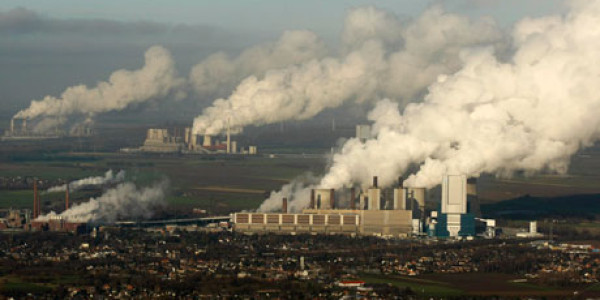Policymakers say a higher price is essential to encourage more greenhouse gas reductions across Europe’s industry Damian Carrington guardian.co.uk , Wednesday 3 July 2013 The EU emissions trading scheme, the largest in the world and now being replicated in China, is intended to tackle climate change by reducing CO2 emissions across Europe’s industry. Photograph: Ina Fassbender/Reuters[/color] Critical reforms to Europe ‘s flagship scheme for cutting carbon emissions were passed for the first time on Wednesday in the European parliament. The move immediately caused the price of pollution permits, currently near rock bottom, to rise. Policymakers believe a higher price is essential to encourage more greenhouse gas reductions. The EU emissions trading scheme, the largest in the world and now being replicated in China, is intended to tackle climate change by reducing CO2 emissions across Europe’s industry. But a huge oversupply of permits, owing to the economic crisis causing production to drop, and because of lobbying by industry, caused the price paid to emit a tonne of carbon to crash in recent years . The short-term fix approved on Wednesday will delay the release of permits for 900m tonnes of carbon, cutting the oversupply, and member states will now decide how to implement the plan. German MEP, Matthias Groote, who steered the reforms through the parliament, said: “We shall not let the ETS be the victim of short-term concerns. Structural reform of our emissions trading system will follow to ensure it remains the cornerstone of EU’s climate policy.” “The symbolic nature of this vote cannot be underestimated,” Rob Elsworth, from carbon trading thinktank Sandbag. “The parliament has shown that it sides with climate ambition and has silenced those looking to kill the EU carbon market.” EU commissioner for Climate Action Connie Hedegaard also welcomed the vote. “We must have a well-functioning carbon market to boost innovative low-carbon technologies in Europe,” he said. Ed Davey, the UK’s energy and climate change secretary, said the vote was an important step forward. “We need a stable carbon market so we get a more certainty for investors so emissions reductions can be achieved at the lowest cost possible.” Analysts suggest that only the cancellation of permits, not merely a delay, will be sufficient to drive up carbon prices to the level that ensures industry acts to cut emissions. But amid intense industry lobbying it has been politically difficult to make any reforms: a proposal to delay – or backload – permits was defeated in the European parliament in April , causing the carbon permit price to fall by almost half on the day. On Wednesday, the vote was carried by 344 to 311 votes. However, energy intensive industry groups said they were disappointed at “interference” in the market. Ian Rodgers, director of UK Steel, said: “The parliament not only took the wrong decision on backloading, but also rejected an amendment which would have provided much needed [financial] support for industries that face significant barriers to reduce emissions.” Rhian Kelly, CBI Director for business environment, said: “British business is committed to the ETS as the cornerstone of EU energy and climate change policies [but] the commission must also improve support for those businesses most at risk from any future reforms.” MEPs rejected a number of proposals intended as compromises to industry. BNEF carbon analyst Konrad Hanschmidt said: “This was more bullish than the market had anticipated.” Nick Robins, at HSBC bank, said: “This will provide a modest – but temporary – boost to the market. More importantly, we expect that this will provide positive momentum for [future] structural reform of the ETS.” The carbon price rose 10% to €4.75 by mid-afternoon on Wednesday but remained about 50% down on its 12-month high of €9. The EU’s four biggest nations – UK, France, Germany and Italy – and at least eight other member states are in favour of strengthening the EU emissions trading scheme , as are dozens of major companies including Shell, E.ON, SSE, ENEL, Unilever and Ikea. David Hone, Shell’s chief climate change adviser, said: “The ETS is the most cost-effective approach to meeting Europe’s energy needs and reducing emissions over time. It is in urgent need of reform and backloading is an important first step.” The reform was also opposed by MEPs in the Conservative EPP grouping, including all but one Conservative MEP who defied David Cameron to vote against the backloading. Cameron wanted an even more ambitious backloading, of 1,200m permits. The UKLibDem’s European environmental spokesman and MEP Chris Davies said: “Conservative MEPs have turned their back on the future and shown their contempt both for the needs of British industry and the policies of the coalition government.” The ETS was launched in 2005, to allow the buying and selling of permits and ensure carbon was cut where it was cheapest to do so. Prices crashed during the first trading period to near zero in 2007, because of the over-allocation of permits. But traders dismiss that collapse, blaming it on early errors in the experimental phase of the market. The carbon price hit a peak of €32 in April 2006 and traded above €30 in 2008. Wednesday’s reforms will mean backloading can only happen once before 2020. Analysts believe the backloading of 900m permits could raise carbon prices to €15, but say prices above €20 are needed to give utilities sufficient incentive to make serious switches to lower carbon energy generation. Greenpeace’s Joris den Blanken said: “The Parliament unexpectedly rejected a further weakening of the plan, but there is still not too much to celebrate. As soon as the suspended allowances are allowed to re-enter the system, the carbon market will be back to square one.” He said 2.2bn allowances must be cancelled before 2020 to restore the credibility of the ETS.[/font][/color] Taylor Scott International
Emissions Trading Reforms Raise Price Of Pollution Permits

This entry was posted in Investment, investments, News, Property, Taylor Scott International, TSI, Uk and tagged carbon, china, conservative, director, investment, news, pollution, victim. Bookmark the permalink.







